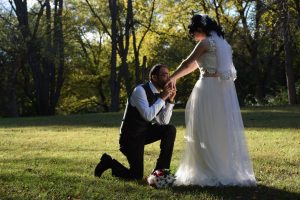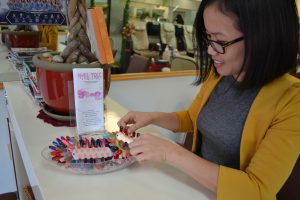By Luke Bollinger
Zubair Rushk is not the typical student at UNC-Chapel Hill. He’s not a typical U.S. citizen. Zubair is from Syria, but he fled the country to escape persecution from the Bashar al-Assad regime. His body is a representation of the experiences of his early life. He walks with a limp from a childhood disease. His glasses sit crooked on his nose, a result of it having been broken multiple times. At times he flashes back to traumatic events, something no amount of therapy can fully mitigate.
Zubair was resettled in Durham in 2010. Since then, he has built a good life for himself. Zubair considers himself lucky to have landed in Durham, as the Triangle has proven to be a welcoming and accommodating place for refugees with numerous organizations devoted to easing the transition and creating fulfilling lives for them. Despite all the good Zubair has found while living in Durham, the events that led to his resettlement are something he carries with him every day. It is part of who he is. Those traumatic times are what make him unique. His journey to Durham holds parallels to the journeys of many refugees. It’s a journey of pain and resilience.
Pain
As a child and young adult, Zubair was a troublemaker, but not in the way one might think of a typical rebellious child growing up in the U.S. He was a troublemaker because he refused to let his pride in his culture be suppressed. Zubair is a Kurd, a minority within the Syrian population. The laws of Syria prohibit students from speaking Kurdish in school, on the streets and even in their own homes.
Zubair never understood why he must disassociate himself from his cultural identity, so he decided he would speak Kurdish in school. He described this act of defiance as if it were kids passing notes to each other or shooting spitballs across the classroom, hoping the teacher didn’t notice and getting a sense of glee when they weren’t caught. But he did get caught. The teacher heard him and called the police. Zubair went to prison.
It was only two days, and he wasn’t harmed. It was only meant to scare him. It would be nine years until Zubair found out what prison was really like.
At the age of 23, Zubair was operating a Kurdish school in a spare room of his home. He taught around 40 students, mostly children and teenagers. He used Kurdish books on history, language and culture to teach them. Just owning these books was a crime in itself.
In his eagerness to share his knowledge, he allowed two men he did not know to enter his home. The men claimed they lived in the neighborhood and wanted their children to attend his school. Zubair showed them the room where he held class and the books he used to teach. He realized his blunder before it was too late. And when he did, he tried to leave his home, hoping escaping the house could save him. But a car was already waiting outside. He was put in the car and escorted to prison for questioning.
For the next 72 hours, Zubair was beaten and tortured, and not a single question was asked. He was then asked to sign a document stating that he had been found with a gun in his home and was participating in the Kurdish rebellion, which had sprung the day before he was taken to prison. He refused. His captors then continued to beat the resolution out of him. They succeeded after three hours. Zubair said he later felt shame for giving in and signing the document after three days when he heard that one of his friends withstood the same treatment for eleven days.
He received a seven-month sentence for his crimes, and they would be the worst seven months of his life. It was during these months that Zubair would come to fully understand the meaning of pain. There seemed to be no end to the torture and beatings.
Zubair was not silent during his time in prison. He defied authority in the only ways he could. He screamed. He cursed the guards. He cursed the government that restricted his freedom and suppressed his identity. And he did not go unnoticed.
Two weeks before he was released, Zubair’s resolution would undergo its greatest test. The prison administration knew he would be a problem once he was released. His defiance had been all too evident. They sent him to the ‘Dark Room,’ which consisted of a single chair. Zubair was strapped to the chair, and his head was placed in a brace. He couldn’t move an inch in any direction.
The guards left, and he was alone. He had been in solitary confinement before. He was optimistic – scared, but optimistic. He had been in this type of situation before. Then he felt a drop of water hit his head, then another and another.
Zubair remained hopeful. He thought he would get a shower. The water dripped through his hair, down his unwashed body and to his toes. However, after 30 minutes, each drop of water seemed to weigh 10 pounds heavier.
Drip. Drip. Drip.
His body began to shake and go numb. He lost his vision, hearing and ability to speak. More tragically, Zubair lost his memory, as if the small drops of water had hammered out all the most important functions of his brain.
Once Zubair was released from prison, it would take him three months to learn to speak without a stutter. It would take him years to recover his full memory.
After his release, Zubair received a notice in the mail of pending legal charges for his defiance. The family lawyer told Zubair his best option was to leave the country. So he was smuggled to Lebanon.
The money paid to the smugglers was guaranteed to provide Zubair a donkey at the border, a more desirable mode of travel compared with walking, as he had been diagnosed with polio at the age of two and has always felt the effects when he walks. Once his family paid the smugglers at the border and drove away, the smugglers removed Zubair from the donkey and pointed him toward a mountain. A mountain he would need to climb in order to cross the border. So he climbed, on his hands and feet, until he conquered the mountain.
Zubair would remain in Lebanon for five years. During that time, he worked as a self-employed electronic engineer to help his brother pay the bills. Zubair went to physical and psychological rehabilitation for the first three years of his stay, a service provided by the U.N., which Zubair had applied to for refugee status. After five years of escaping Syria, Zubair found out he would be resettled in Durham, North Carolina.
Resilience
Arriving in Durham was the greatest blessing of Zubair’s life. The resettlement agency found him a small apartment consisting of three pieces of furniture. The agency gave him enough money for groceries and a month’s rent and told him they would help him find a job. Instead of waiting for the agency to finish the job search, he took the initiative to find a job himself.
He traveled to The Streets at Southpoint mall every day and visited as many restaurants as possible, asking if they were hiring. He spoke very little English, but he knew enough to inquire about jobs. On the twelfth day of his search, the manager at The Cheesecake Factory agreed to hire him. He did not know how to fill out the job application, so the manager, Jeff, helped him fill it out.
Zubair is grateful for Jeff to this day. Grateful that someone would hire him despite the fact that he spoke little to no English and couldn’t even fill out the job application on his own. Zubair said because of the welcoming and accommodating Triangle community, the area quickly began to feel like home.
Community
Zubair is not an anomaly. The Triangle has proven to be a sanctuary for many refugees.
Scott Phillips, director of the North Carolina branch of the U.S. Committee for Refugees and Immigrants, said his organization is the first point of contact for many refugees who come to the Raleigh area. Phillips said the organization finds affordable housing for refugees, provides them with three months’ rent and helps about 90 percent of refugee families become financially self-sufficient within the first 120 days.
“In the area, we’ve really seen, and our clients have seen, really friendly people here who are willing to take the extra step to work with refugees,” he said.
Phillips recalled a phone call he received during the holidays. The call came from an employer who had hired a refugee who had been resettled through Phillips’ agency. He told Phillips he was hosting a holiday party for his employees and he was not sure of the religion of the one refugee worker. He was wondering if there was anything he could do to make the employee feel more included in the festivities.
“That is amazing,” Phillips said. “That’s so great. He didn’t have to do that. That’s the guy who stocks the shelves. They didn’t have to take that extra step, but they did.”
Still, refugees in the community consume media like everyone else. Despite the warm welcome most refugees receive in the Triangle, many are still fearful of their place in the country. Phillips said he has heard the concerns of many refugees regarding the rhetoric toward them in the past presidential election and recent executive orders.
“There’s a lot of fear after the initial executive order on refugees,” he said. “Then you turn around and see 1,500 people at RDU and people at the rally the next week. That was a concrete example of North Carolina spirit and American values. That resonated with our clients a lot.”
Zubair has also noticed the contrast between what is said in the media and how people actually treat him and other refugees. He said despite the country being deeply divided on views towards refugees, false perceptions can’t diminish what he calls “this heaven I’m living in.”
And for Zubair, it is heaven indeed. He became a U.S. citizen in 2015, he works hard at multiple jobs and he’s on his way to completing his degree in peace, war and defense.

Perhaps one of the biggest moments of Zubair’s time in Durham was when his wife joined him. With the help of U.S. Rep. David Price, his wife wasable to complete the vetting and resettlement process in two years, a short timespan compared to the lengthy process many refugees must go through. Zubair and Etena, his wife, were married in October 2016 and are hoping to start a family soon.
Edited by Matt Wotus
